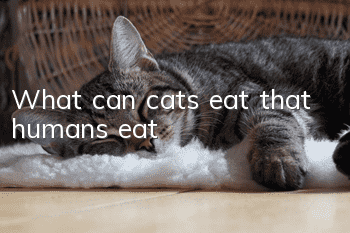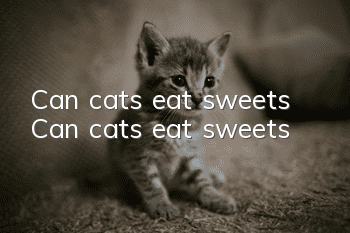What can cats eat that humans eat?

The following things cats can eat:
1. Egg yolks, fish, rice, etc. that are eaten by humans should be cooked without adding seasonings such as oil, salt, etc. Can be given to cats.
2. You can also feed cats apples, pears, bananas, broccoli, potatoes, carrots and other fruits and vegetables, but be sure to pay attention to the appropriate amount, and fruits containing stones must be removed.
3. You can also give your cat some sugar-free yogurt occasionally. The lactic acid bacteria in the yogurt can promote the peristalsis of the cat’s gastrointestinal tract and help the cat’s gastrointestinal digestion and absorption.
The following foods that cats should not eat are:
1. Foods from the onion, garlic, and spice families: such as onions, scallions, shallots, leeks, and red peppers. Onions, ginger, garlic, etc. These foods contain ingredients that destroy red blood cells and can easily cause hemolytic anemia in cats, leading to vomiting, diarrhea, fever and other symptoms. In severe cases, the cat may die.
2. MSG and other seasonings: Cats are very sensitive to MSG and will have a allergic reaction within 48 hours after eating it. The symptoms are very similar to epileptic spasms, which can easily lead to misdiagnosis by doctors.
3. Food or drinks containing caffeine, theophylline, and alcohol: These foods are toxic to cats and have a great impact on the cat’s heart and nervous system. It can easily cause symptoms such as frequent urination, hyperactivity, vomiting and diarrhea, heart damage, epileptic spasms, and bleeding in the digestive system in cats. Alcohol can cause cats to become mentally disturbed, and in severe cases can cause shock and kidney failure.
4. Xylitol: Excessive consumption of xylitol can cause damage to the cat’s liver, and in severe cases may lead to the death of the cat.
5. Mushrooms: Some mushrooms may contain various toxins, which can cause damage to the cat’s liver or kidneys or even damage the nerves, affecting multiple systems in the cat’s body, causing the cat to go into shock and die.
6. Bones: Heated animal bones will puncture the digestive organs and harm the cat’s mucosa. Some of them staying in the intestines can cause intestinal occlusive disease. In severe cases, they can cause suffocation and internal bleeding.
7. Certain fruits: Grapes/raisins can cause poisoning, cause kidney failure in cats, and are life-threatening. Cats cannot eat them. Cats that eat too much cyanide-containing fruits, such as peaches, apricots, and plums, may suffer from vomiting, rapid heartbeat, and even shock. The pits, stems and leaves of cherries are poisonous and can cause diarrhea and difficulty breathing in cats. The glyceric acid in avocado cannot be metabolized by cats and will affect the cat’s digestive tract. Symptoms such as dyspnea, high fever, fluid accumulation in the chest and abdominal cavity, and even death may occur after consumption. Green plums also contain toxins. Cats may convulse and foam at the mouth. The substances contained in nuts can interfere with the release of oxygen from the blood. The lack of oxygen can lead to insufficient oxygen supply and suffocation. In mild cases, cats may become dizzy and nauseous. Severe cases may cause difficulty breathing, convulsions, respiratory paralysis or even death.
8. FirmFruits: Eating nuts can cause symptoms such as weakness, joint pain, vomiting, and swelling in cats. Cats’ livers are particularly fragile, so cats cannot eat nuts.
- What does "little milk cat" mean? How old is a cat?
- Kitten doesn't eat or drink and foams at the mouth
- How many litters can an Exotic Shorthair cat have in a year?
- Can cats eat chicken breast?
- Why is the "British short" more popular than the "American short"?
- Why is my cat still barking and peeing everywhere after being neutered?
- Why is it not recommended to buy short-legged cats? Why is it not recommended to buy short-legged cats?
- Six major questions about probiotics for pets!
- How to make a cat have a big appetite?
- Will a female cat regain puberty after being neutered?



